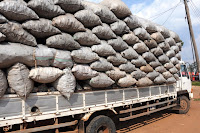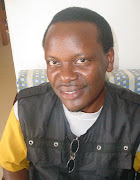 By Ebenezer T. Bifubyeka
By Ebenezer T. BifubyekaIn Biafra, Mbarara, western Uganda.
POPULATION increase continues to push Ugandans forest cover to the chambers of extinction as the need for charcoal and firewood also increases.
Fortunately, residents of Luwero district have improvised a briquette (charcoal made out of dust and other agricultural waste) business to countercheck charcoal business. If this technology is adopted, it will save the remaining forest cover in the area and in the entire country. Briquettes are a type of charcoal made out of charcoal dust, any dry leaves, grass, soft boards and paper.
Margaret Nasasira, the owner of Musa Restaurant and a pastoralist has used briquettes for three months. Nasasira, a mother of eight, first heard about briquettes from a friend. Since then, she has been buying four kilos of briquettes daily.
‘I have discovered a lot of benefits from using briquettes: they are cheaper and economical; I used to spend sh60,000 on charcoal per month but now I spend sh40,000 on briquettes every month, saving sh20,000,’ says Nasasira. Besides, Nasasira adds, briquettes last longer than charcoal. Unlike briquettes, charcoal emits smoke and leaves soot on the saucepans.
Nasasira says briquettes have enabled her to save; and she uses her savings to buy chicks for poultry. She also uses her savings to buy school materials like mathematical sets for her child. ‘I therefore encourage other people to use briquettes, for they are economical and environmentally friendly,’ she sensitises.
Mwamiin Namigadde, 43, an improved stove (cock stoves) dealer, is another user of briquettes. ‘I first saw these improved charcoal stoves in Kampala and bought one only to find it good and cost-effective,’ she discloses. Today, Namigadde sells 10 to 15 charcoal stoves a month during which she earns sh200,000 to sh300,000. The big size goes for sh25,000, medium size goes for sh18,000; small size goes for sh15,000 and the smallest goes for sh12,000.
Namigadde also sells briquettes. She sells each small bag of briquettes at sh1,200; and she earns a monthly profit of sh30,000 from her 10 customers. ‘My customers come after every two days. They have realised the benefits of using briquettes: they are cheap, food takes shorter time to get ready compared to ordinary charcoal stove; and fire from briquettes burn for a longer time. Briquettes keep the chicken clean and don’t burn the place where they sit – unlike charcoal and firewood. The improved charcoal stoves have a durability of three years,’ says Namigadde. She adds that she now uses her profits to buy construction poles and then sell them at a higher cost. She also pays school fees using her profits.
Rose Mugisha, 34, uses briquettes to cook all kinds of food to feed her four children and other six members of the family. ‘Briquettes are economical, faster in cooking and they help me to save because I use one sack per month unlike three weeks that I would spend using one sack of ordinary charcoal,’ she says. Now Mugisha saves one sack of charcoal in four months, and three sacks in a year. She says she has not realised any single problem with this kind of stove.
Umar Karimani Baryamushanga, a 33-year-old forester (he did Community Forestry at Makerere University), has trained about 120 youths in making improved charcoal stoves and briquettes.
Asked about what he makes briquettes from, Umar, who owns Ngabo High School of Science and Technology in Luwero, says he makes briquettes from biomass dust; that is anything that had life before such as charcoal dust, any dry leaves, grass, soft boards, paper and many others.
Under his organisation, Ngabo Integrated Community Environment Concern (NICEC), Umar supplies fliers to sensitise the public about how to make improved charcoal stoves, how to make briquettes and the benefits of using such products both to man and the environment.
Umar, who also has a group of women that make baskets from swamp materials, goes from one restaurant to another – sensitising people about the use of briquettes. ‘Before I started carrying out massive sensitisation about briquettes, I used to sell 150 to 200kgs of briquettes. Now I sell 2,000kgs. I also sell 50 cock stoves (improved stoves) compared to less than 20 that I used to sell before sensitising people,’ he compares, adding that he makes a net profit of sh40,000 from briquettes and sh500,000 from the improved stoves.
However, Umar is facing some challenges such as capital to buy electric extroder for briquettes, and lack of capacity to export his briquettes. Using a Manual Briquette Press Machine, Umar produces 60kgs of briquettes every day. A smile is rupturing on Umar’s face as more people come to him to train in how to make briquettes.
‘The good news is that with this briquette business, I’m able to sponsor my sister for a medicine course at Makerere University. Besides, I’m financially supporting 60 students at my school (Ngabo High School of Science and Development). He charges sh120,000 from each day-scholar and sh210,000 from every student in the boarding section.
Umar, who is also a Rosera juice manufacturer and rarer of 12 Friesian cattle, has registered 208 women resource managers after training them in gender and environmental preservation. ‘Each of these women makes her own briquettes thanks to me,’ Umar says, proudly. One of these women, Zam Nagawa says they buy charcoal dust and other agricultural waste from Umar. A dry rack is in place to dry briquettes.
‘We want women to become owners as well,’ says Umar, adding, ‘one main challenge these women are facing is shortage of briquettes, press machines for all of them to use. Currently, all these women use one briquette machine!’ They are peasant farmers. Though each of them has an agricultural mask, these women need a market that is bigger than a local market. Umar says he wants to link these women to bigger charcoal producers. The women themselves are requesting for free interest loans. The loans with low interest rates will encourage the women to work and pay back, says Umar. He adds that the loans act as an incentive.
Word count: 998.


1 comment:
Our posts never fail to inspire. You have such a powerful way of sharing knowledge. Briquetting Machine Price
Post a Comment